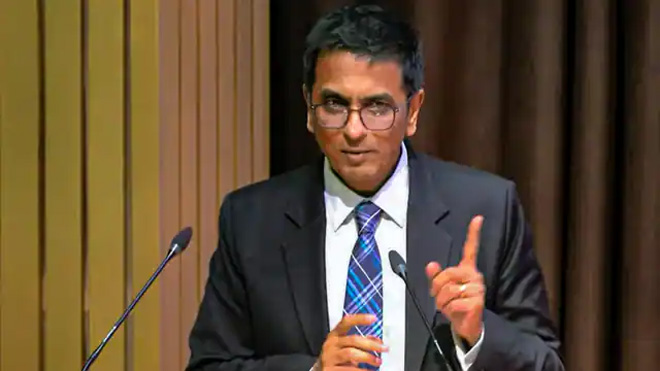‘Truth has become a victim of false news; even judges are not…’: CJI Chandrachud
Truth is a victim in an age of false news, Chief Justice of India (CJI) Dhananjaya Y Chandrachud said on Friday, while also lamenting what he said was a lack of tolerance that has emerged as one of the biggest challenges of modern times.
Speaking at a conference organised by the American Bar Association, CJI Chandrachud said that while humanity has expanded with the global advent of travel and technology, it has also retreated within by not willing to accept anything that we as individuals believe in.
Terming lack of patience and tolerance among the masses as the biggest challenge of our age, the CJI said that a part of this condition is due to the advent of technology itself.
“Truth has become a victim in an age of false news. With the spread of social media, something which is said as a seed on social media can germinate, virtually, into a whole theory which can never be tested on the anvil of rationale,” the CJI said during the inaugural address of the two-day event.
Saying that even judges are not spared from trolling, the CJI said, “For every little thing that we do, and believe me, as judges we are no exception to this, for everything that we do, there is a threat of being trolled by someone who doesn’t share your point of view. We live today in an age where people are short on their patience…They are short on their tolerance because they are not willing to accept perspectives which are different from our own.”
The top court judge said that a danger that society faces is that technology and its repercussions are “flowing out of control”.
“The grave danger that we face is the danger of not being able to combat what we have now set forth, a change which humanity has brought in terms of the advent of technology but which is perhaps flowing out of control,” the SC judge said.
Highlighting the benefits of globalisation, the CJI also said that it has its own discontents and cited four reasons for the same which include terrorism, climate change, Covid-19 and inequality.
Referring to the 9/11 attacks at the World Trade Centre in 2001, the top judge said, “There has been a surge in anti globalisation sentiment. The first of the origins of this lay in the terror attacks in 2001. India was shaken by terror attacks but 2001 was a watershed moment which brought to the global society the stark realities which India had already confronted for years before that.
Talking about the second reason, CJI Chandrachud said that climate change has impacted people across the globe, while adding that it is not an elitist notion, but directly affects the marginalized section of the society.
“Climate change is not an elitist notion. It recognises the impact of something that starkly faces our society, especially communities in coastal nations and coastal states which would be affected by the impact of pandemic,” he said.
Elaborating on the fourth reasoning, the CJI said that the “share of the increased pie due to globalisation consumed by the lower half was much less than the share consumed by a quarter of the community”.
He further added due to the advent of globalization, the Indian Penal Code, even though drafted in 1860, has changed.
Solicitor general Tushar Mehta said that India has now become a destination as an economic powerhouse in the world. He said that in the last 5-7 years, there has been a remarkable jump in the Indian industrial sector.
“In the index of ease of doing business, India has made a sudden jump and is now crossing the 79th mark from where it started,” he said.
While hailing India’s initiative in producing vaccines, the SG said that during the Covid-19 pandemic, except one or two countries, no countries had their own indigenous vaccines.
“India could produce two local vaccines. India gave 2.2 million doses to its citizens and administered total vaccines to 2.5 times the total population of the US and EU together,” the SG said.
Other dignitaries included Lubna Shuja, president of Law Society of England and Wales, Marcos Rios, chair of the ABA international law section, Prathiba Jain, chair, India Committee, ABA , Head of Strategy and Group General counsel , Everstone group and Miachel D Williams.


Comments are closed.